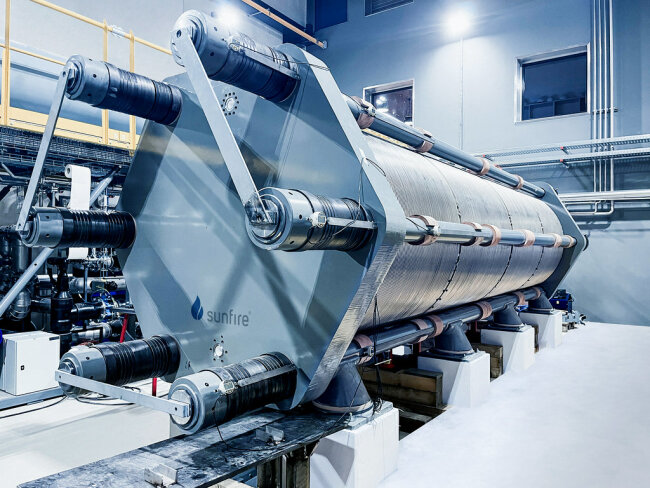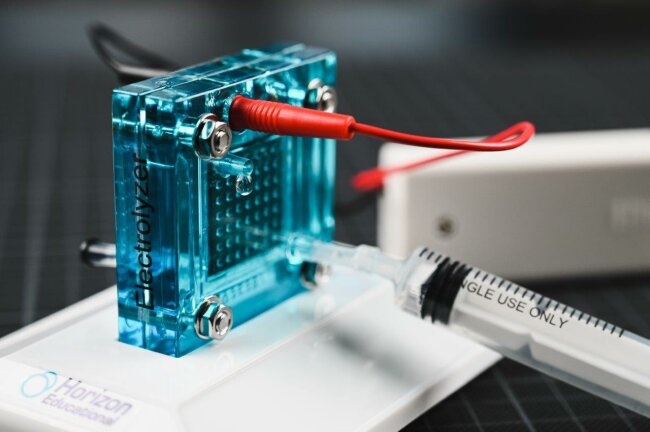Guide to Buying a Hydrogen Generator

In a world increasingly focused on sustainability and clean energy, hydrogen has emerged as a solution for a variety of applications. Hydrogen generators have become increasingly essential for industry, research and even domestic use, as they provide a convenient way to produce hydrogen gas on demand. But buying a hydrogen generator can be confusing. What are the different types available, and what are the advantages and disadvantages with each? Luckily, Horizon is here to help. We’ll take you through the hydrogen generators (electrolyzers) on the market today, giving a complete guide for those looking to make an informed decision.
What is a Hydrogen Generator?
A hydrogen generator is a device that produces hydrogen through a chemical process. Usually this happens via something called electrolysis, where an electrical current is passed through water, splitting it into hydrogen and oxygen.
That’s why most hydrogen generators are called ‘electrolyzers’.
Some of the advantages of using electrolyzers are:
- They’re reliable and can produce ultra-pure hydrogen (> 99.99%) without any pollution when the electrical source is renewable energy.
- This hydrogen can be produced directly on-site, saving costs on storage
- They’re much cheaper than using gas supplied in high-pressure cylinders
Types of Hydrogen Generator Designs
There are actually many ways to build and configure an electrolyzer. These can be divided into two main types of designs: unipolar and bipolar. The unipolar design typically uses a liquid electrolyte (alkaline liquids), while the bipolar design uses a solid polymer electrolyte (proton exchange membrane or ‘PEM’). In the past something called potassium hydroxide was a commonly used electrolyte, but recently PEM electrolyzers have become more common.
Alkaline Electrolyzer

Alkaline electrolyzers work by using an aqueous potassium hydroxide (KOH) solution as the electrolyte. Other commonly used electrolytes include sodium hydroxide (NaOH), sulfuric acid (H2SO4), and potassium hydroxide (KOH), sodium chloride (NaCl).
These alkaline electrolyzers operate between 25 – 100 °C, and have pressures of 1 – 30 bar, and have current densities in the range of 100 - 400 mA/cm2.
Chemical Reactions that take place in an alkaline electrolyzer:
• Anode: 4H2O + 4e– 2H2 + 4OH-
• Cathode: 4OH- + O2 + 4e- + 2 H2O
• Overall: 2 H2O → 2H2 + O2
PEM Electrolyzer

Polymer electrolyte membrane (PEM) are the most popular type out there today. The electrolyte is a thin, solid membrane that conducts ions. These hydrogen generators use a bipolar design and can be made to operate at high differential pressures across the membrane.
Reactions that take place inside a PEM-based electrolyzer.
• Anode: 4H+ + 4e- → 2H2
• Cathode: 2H2O → O2 + 4H+ + 4e-
• Overall: 2H2O (l) + 4H+ + 4e– → 2H2 + O2 + 4H+ + 4e–
Advantages of PEM Electrolyzers
One of the reasons that PEM hydrogen generators are so popular is because many of the issues people encounter with PEM fuel cells don’t occur. Water that’s supplied to the cathode can also be easily used to cool the system, and managing water is much easier because the positive electrode needs to be flooded with water.
Another reason for the popularity of PEM electrolyzers is the high purity of hydrogen produced, which can be > 99.99%.
Disadvantages of PEM Electrolyzers
One issue people run into with PEM Electrolyzers is the presence of water vapour in the system, with water making its way through the electrolyte. To fix this electrolyte designers use various techniques to avoid this, like using wider electrolytes than those used in fuel cells.
Hydrogen Generators on the Market Today
The HG Rack Series Hydrogen Generator by Heliocentris
The HG Rack Series hydrogen generator by Heliocentris produces high-purity hydrogen (99.9999 % vol) that can be used in laboratory and research use. This is ideal both for direct operation of fuel cell systems and for filling low-pressure metal hydride canisters.
The system is also convenient and versatile, with the operating controls being intuitive and user-friendly. It can even be connected to a PC via an optional RS232 interface. They’re also incredibly reliable. No hydrogen is stored in the unit, and an intelligent regulator ensures that only the quantity of hydrogen is generated that is currently needed. An integrated leak monitor stops the generation of hydrogen immediately in case of a leak.
The hydrogen capacity can be expanded by connecting up to 10 modular units. One unit is used to conveniently control the others, based on the master-slave principle.
The HG Rack Series Hydrogen Generator is also easily expandable, with the user being able to connect up to 10 modular units. One unit can be easily used to control the others using the master-slave principle.
The price can be found by contacting Heliocentris directly and requesting a quote.
PEM Hydrogen Generator by Horizon Educational
At the other end of the scale, one of the smallest hydrogen generators on the market today is the PEM Blue Electrolyzer by Horizon Educational. Measuring no more than 5cm across, this hand-size electrolyzer is perfect for understanding the fundamental science behind electrolysis. Coupled with other miniature science kits from Horizon – like the small solar cell, wind turbines, fuel cells, or mechanical hand cranks – it's possible to generate hydrogen from completely renewable sources.
Prices start at $ 69.
Conclusion
While alkaline electrolyzers can work well, PEM-based electrolyzers are currently the most popular form of hydrogen generator. And while these polymer electrolyte membrane systems have some drawbacks (like a tendency of water vapour to stay present in the system), the advantages far outweigh the drawbacks. These systems are self-cooling, with supplied water being used prevent the system from overheating, and managing water is extremely simple. They also produce hydrogen of extremely high purity, such as the HG Rack Series Hydrogen Generator producing hydrogen that’s over 99.9999 % pure.



